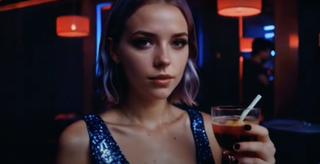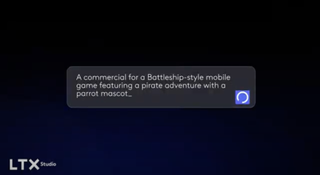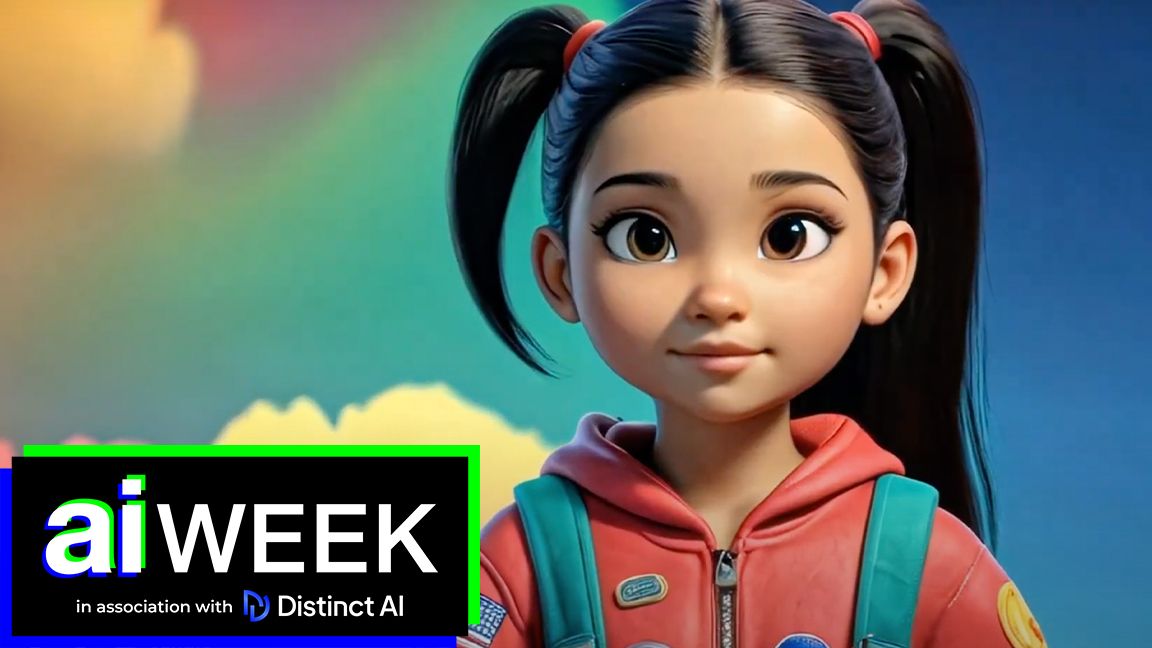AI is on everyone’s lips and at Creative Bloq, we’ve been shining a spotlight on this important topic across a number of creative disciplines as part of our AI Week. We’ve heard from artists working in the film industry on how AI could affect VFX, which reveals how issues around AI are nuanced, and it can be difficult to know what the outcome of all this exploration will be.
Technology is transforming the way films are created and AI is part of that growing mix, offering new possibilities for both established filmmakers and aspiring creators. Some would argue that AI will and should one day be able to do everything, whereas other creators want to protect the human element of any creative endeavour. (The issues around AI and copyrights aren’t going away and need to be fixed before an industry can take it seriously.)
I had the opportunity to talk with AI-first company Lightricks CEO, Zeev Farbman to delve deep into the world of AI-powered filmmaking. Farbman shares his insights into how AI is changing the filmmaking landscape and explores the potential of AI to streamline workflows, enhance creative expression, and democratise filmmaking.

What do you think of the recent developments of AI within the film industry?
Zeev Farbman: Any tool that can enhance human creativity and bridge the gap between our imagination and creative results is a step in the right direction. The emergence of LLMs and gen AI capabilities is changing the way people interact with computers and with our own ideas in every field, including the film industry.
The way I see it, as the technology matures and the tools are refined, AI will automate many of the time-intensive elements of production, allowing filmmakers to focus on the magic that brings their ideas to life on screen.
As part of our development of LTX Studio, we spoke with many filmmakers and advertising creatives to understand what they needed right now. What we’ve heard is a desire for faster and more efficient tools for pre-production, like a storyboard to capture their visions throughout the process and show them a glimpse of the final outcome before they even start shooting, saving time on rewrites, reshoots, etc.
What is your approach to AI within the film industry?
ZF: We’ve been working with AI for a long time – primarily in our mobile apps Facetune, Photoleap, and Videoleap. With LTX Studio, we’re excited to start catering to the professional creators in film and production teams. We believe in truly democratising creativity – allowing more people to have the tools to create, at a lower cost for those who lack extensive resources or access to larger agencies or studios.
We don’t believe AI will replace filmmakers, but that it will enhance their creative process by streamlining expensive and tedious tasks. For example, LTX Studio uses generative AI to offer pre-production and post-production capabilities, including script generation, voiceover, sound effects, and character development. This allows filmmakers to devote more time to the parts of filmmaking that require more focus, like filming A-roll and creating awe-inspiring special effects.
The fusion of human creativity and AI-based tools are necessary for advancements in the industry. Technology is here to support and amplify creators, not replace them – just like advancements in computer graphics changed the ideation and creation process between the 1950s and 1990s. By embracing AI in film, we will see even more creators have the resources to develop films and break into the filmmaking industry.

Do you have any reservations about using AI?
ZF: Just as with the introduction of any game-changing technology, the concern shouldn’t be about the capabilities of the tools, but the potential of certain people to misuse the technology for their personal gain, create misinformation, or cause harm. To this extent, it is important not only to develop AI, but also to educate people about it and the changes it brings with it.
However, the increasing availability and awareness of AI is a good thing. Over time, this awareness builds a more critical perspective, where people will question and assure the source of the content they consume before taking it for face value.

What role do you see AI playing in the future of filmmaking?
ZF: We already see public perception of AI changing as companies produce AI-generated music and images, and we understand that video content is the next step. It’s fascinating to witness the expanding influence that generative AI has across these industries. The ability to generate high-quality film content at a significantly lower cost is revolutionising the way we make creative projects, enabling new forms of storytelling and visual expression to emerge.
In addition to inspiring filmmakers in their creative process, AI tools are being used to automate time-consuming tasks like post-production clean-up and colouring work, which can take years to complete. These tools can streamline various aspects of production, allowing artists to focus more on the creative elements rather than repetitive tasks, benefitting film projects of all types and sizes. Whether it’s a short- or feature-length film, all filmmakers can leverage the power of AI to maintain focus on expanding the boundaries of their creativity.

Where would you draw the line and say AI is having too much influence?
ZF: Tools don’t influence anything unless someone uses them to do so. What people do with AI-first creative tools that are based on generative AI is changing on a daily basis. One thing remains consistent: creative individuals are the ones making the choices when it comes to ideation, quality control, and the final content produced with these tools.
AI has developed the misguided reputation of being seen as a replacement, not a tool. However, when used appropriately—to assist with projects and improve efficiencies – AI will only open the door for increased productivity and creative opportunity.
How can we guard the creative industry against going in the wrong direction with AI?
ZF: AI-based creative tools are going to give everyone a lot of power, and we all know that power brings with it the need to act responsibly. To me, people need to have a good moral compass so they can make the right decisions and steer humanity in a good direction.
This is true with AI in the creative space, but it is true with everything we do in our lives – at home, with our friends, or in the workplace. As AI becomes more ubiquitous and people understand the strengths and potential misuse – they will be more skeptical about the source or platform where content originates.

What AI job roles do you see becoming increasingly common in filmmaking?
ZF: I’m not sure exactly how these roles will evolve over time, I only know that at Lightricks, we’ve started hiring for positions that didn’t exist a year ago, and that there are more positions to be invented. This is true for Lightricks, but it will be true for many others, including the filmmaking industry.
I believe we’ll see AI used directly alongside members of an entire filmmaking team, from ideation to post-production. AI is able to help automate processes within the technical aspects of filmmaking, such as sorting through different shots of the same scene, audio mixing, and storyboarding. We can expect to see AI jobs within these areas of filmmaking to allow more time for filmmakers to focus on their creative output.
We’ll also see AI impacting the role of visual effects. Software to create stunning, otherworldly effects has always been used, and with the advent of AI, these professionals will be able to push existing technology to the next level – creating even more realistic and show-stopping creations.

What role do you see LTX Studio having in the future of the film industry?
ZF: At Lightricks, we want to make creativity and creative processes accessible to all and aim to lower the threshold to creation. LTX Studio is designed for creatives of all levels – filmmakers, agencies, content creators, and more – to help them bring their ideas to life. LTX Studio opens up the ability for more people to enter filmmaking themselves, opening the door for an entirely new generation of creators. We are doing our part to lower the barrier to entry in the filmmaking industry.
At the same time, we also see it being used by seasoned professionals for more technical aspects that they might not have the resources to complete. For example, if there’s a scene they want to set in winter but had to shoot in the summer, they might consider flying somewhere where it is winter to get the shot. Now, they can use LTX Studio to generate a winter scene and compare the two. This will allow them to either feel confident in their decision to shoot on location or move forward with their original piece.
How do you ensure AI tools don’t replace artists and creatives?
ZF: Lowering the threshold for the creative process, and empowering creatives to create content at a faster pace, will push human creativity forward. As we discussed earlier, we believe AI will empower more creatives, build new job opportunities within the creative process, and give creatives ways to capture and present their ideas in more simple, and provocative ways.

What direction do you plan on taking LTX Studio in to serve the film industry?
ZF: Growing acceptance of AI was visible this year at Cannes, which featured multiple AI presentations, like the French comedy ‘The Second Act’. It’s inevitable that filmmakers will experiment with generative imagery, and it is our responsibility to support artists by continuing to provide tools that will enable their creativity. As more people accept AI-based tools for ideation and creation, we’ll see more innovation and aspiring filmmakers emerging.
Our recent Visions update for LTX Studio evolved from feedback from thousands of users granted early access to the platform. This update gives creatives even more powerful tools to bring their visions to life across various applications, from pitching film concepts to visualising written scripts. The new features meet the diverse needs of professional creators who need effective ways to pitch their ideas, visualize concepts, and build detailed production presentations.
Whether it’s a large studio wanting to save resources on location shoots or a beginner seeking a new outlet to express themselves, we will support them throughout their journey, as our mission is to build tools to support anyone with a vision. It’s amazing to watch the growing impact that AI innovation will have across film, advertising, and other visual industries.
Creative Bloq’s AI Week is held in association with DistinctAI, creators of the new plugin VisionFX 2.0, which creates stunning AI art based on your own imagery – a great new addition to your creative process. Find out more on the DistinctAI website.
